
* Corresponding author
E-mail address: ptthien.kt@uneti.edu.vn (T.T. H. Phan)
© 2020 by the authors; licensee Growing Science.
doi: 10.5267/j.uscm.2019.7.006
Uncertain Supply Chain Management 8 (2020) 175–186
Contents lists available at GrowingScience
Uncertain Supply Chain Management
homepage:
www.GrowingScience.com/uscm
The impact of supply chain practices on performance through supply chain integration
in textile and garment industry of Vietnam
Thi Thu Hien Phana*, Xuan Toan Doanb and Thi Thanh Tam Nguyenc
aUniversity of Economic and Technical Industries, Vietnam
bUniversity of Kinh Bac, Vietnam
cAcademy of politics region I, Vietnam
C H R O N I C L E A B S T R A C T
Article history:
Received June 17, 2019
Received in revised format June
28, 2019
Accepted July 17 2019
Available online
July 1
7
2019
This paper is intended to evaluate intermediary role of SCI in the relationship between supply
chain management practices (SCMP) and supply chain performance (SCP) and, at the same
time, to examine the regulatory role of firm size and transformational leadership in this
relationship. The research is conducted on 536 Vietnamese textile and garment enterprises and
the results show that SCI had a complete intermediary role in the relationship between SCMP
and SCP. Additionally, Size and Transformational leadership also play statistically significant
regulatory role in the relationships between SCMP and SCI as well as between SCMP and
SCP. Accordingly, it is recommended that enterprises should implement SCMP well to
improve the effectiveness of SCI and SCMP, contributing to sustainable development and
ensuring requirements of global supply chains.
.
by the authors; licensee Growing Science, Canada
20
20
©
Keywords:
Supply chain practices
Performance, supply chain
integration
Textile and garment industry
Vietnam
1. Introduction
Currently, Vietnam is increasingly integrating comprehensively with countries in the region and around
the world. During the two years of 2018 and 2019 alone, there have been many trade agreements entered
into such as CPTPP, EVFTA, etc., which have created many opportunities as well as challenges for
Vietnam when being part of the world market and global supply chains. Especially for the textile and
garment industry, this is a key industry of Vietnam with the second highest export turnover in the
country, creating job for 1/5 of the total labor force of Vietnam.
However, the survey results of the research group show that most of Vietnamese textile and garment
enterprises still operate under small scale and tattered production, not complying with the standards on
working conditions and origin of materials. In addition, in the context of the US-China trade tensions
if Vietnam does not strictly manage the input materials to ensure the origin of goods, it will be subject
to very high import and export tax rates, which will affect operational efficiency of enterprises.
Therefore, activities of supply chain management play a very important role. In spite of that, in the
context of Vietnam - a developing country, the research on this topic is still very limited, especially in
Vietnam’s textile and garment industry.

176
Research on supply chain management is an area to which many researchers around the world have
paid attention as these activities can create competitive advantages and improve operational efficiency
for enterprises (Azadi et al., 2014; Sabara et al., 2019). Thanks to supply chain management, enterprises
can connect with each other, improve conflicts and create a unified playing field for their mutual
interests (Zhang et al., 2015).
In previous studies, the relationship between supply chain management practices (SCMP) and supply
chain performance (SCP) has been studied a lot, however, there is a lack of evidence for the complex
relationship between SCMP and SCP. Particularly, the research examining SCI’s intermediary role is
still too limited. Previous studies have examined the relationship between SCMP and firm performance
only (Veera et al., 2011), or tested the relationship between supply chain integration (SCI) and firm
performance (Zolait et al., 2010) without referring to the link between SCMP and SCP through SCI.
Notably, almost no author has examined the regulatory role in the relationships between SCMP, SCI
and SCP.
To fill those theoretical and practical gaps, this paper aims to examine SCI’s intermediary role in the
relationship between SCMP and SCP at first. Secondly, it tests the regulatory role of Size and
Transformational leadership in the relationship between SCMP and SCI as well as between SCMP and
SCP. In addition to the introduction, the paper includes the following parts: Overview and research
hypothesis, Research methodology, Research results and Conclusion.
2. Literature Review and research hypotheses
The research is to evaluate SCI’s intermediary role in the relationship between SCMP and SCP.
Previous studies have shown that SCI has a partial intermediary role in the relationship between SCMP
and SCP when surveying 156 electronics companies in Malaysia in the studies by Sundram et al.
(2015), Naway and Rahmat (2019). Enterprises implement a set of supply chain management activities
to promote collaboration between internal departments and cooperate with other companies from
suppliers to customers in the supply chain (Pramatari, 2007). Previous studies have begun to doubt that
the relationship between SCMP and SCP is an intermediate relationship, not a direct relationship, which
depends on the ability to integrate components and organizations across the supply chain through SCI.
Therefore, we propose the below hypotheses:
H1: SCI plays a complete intermediary role in the relationship between SCMP and SCP.
H2: Size plays a regulatory role in the relationship between SCMP and SCI.
H3: Transformational leadership plays a regulatory role in the relationship between SCMP and SCP.
Supply chain integration (SCI): This factor determines the level of integration, integrating supply chain
activities between enterprises, suppliers and customers (Flynn et al. 2010). The role of SCI is to mediate
between enterprises and customers and suppliers based on production process characteristics and
headquarters of enterprises (Naslund & Hulthen, 2012; Setyadi, 2019; Wadhwa et al., 2006). Activities
in SCI include: integrating departments and units within enterprises such as transport unit, material
purchasing unit and production unit; At the external level, SCI will integrate activities between
suppliers and customers in delivery and data flow connection from suppliers to enterprises and their
customers (Schoenherra & Swink, 2012). In order to measure SCI, we use four development scales
from study of Sezen (2008) and measured by a 5-point Likert scale with a score of 1 indicating “strongly
disagree” and 5 representing “strongly agree”.
Supply chain performance (SCP): Supply chain performance is an important part contributing to firm
performance. Previously, in order to evaluate firm performance, most researchers often use financial
efficiency (Hasan et al., 2018). However, in this paper, we aim to evaluate how supply chain
management practices impact supply chain performance or efficiency, a small part of firm performance.
Moreover, SCP is typically a continuous process in the supply chain and thus the biggest challenge
when measuring SCP is to ensure the true performance of the entire supply chain. For that reason, we

T.T. H. Phan et al. /Uncertain Supply Chain Management 8 (2020)
177
measure SCP based on development of the research by Sundram et al. (2015). Measured by 5-point
Likert scale as a unit of measurement ranging from “definitely worse” to “definitely better” in relation
to their major competitors.
Supply chain management practices (SCMP): Activities or policies of enterprises to manage their
supply chains. According to Sandhu et al. (2013), supply chain management activities are established
from 7 aspects: Supplier strategic partnership, Information sharing, Information quality, Customer
relationship, Agreed vision and goals, Risk and reward sharing and postponement. In this paper, we
develop 7 aspects of SCMP measurement developed from the research by Min & Mentzer (2004) and
Sundram et al. (2015). Measured by 5-point Likert scale with a score of 1 indicating “strongly disagree”
and 5 representing “strongly agree”.
Transformation leadership: This is the leadership style of manager towards the stakeholders’ interests.
In order to measure Transformation leadership, we have built 4 items developed from the research by
Waldman et al. (2006). Measured by 5-point Likert scale with a score of 1 indicating “strongly
disagree” and 5 representing “strongly agree”.
Size: This item is also beasured by 5 levels in line with levels of enterprises division of the State of
Vietnam in accordance with Circular No. 39/2018/TT-BTC.
3. Research methodology
3.1. Research sample
Research sample is Vietnamese textile and garment enterprises in “Vietnamese Textile and Garment
Directory, 2018”. On Vietnam’s development path, its textile and garment enterprises play a very
important role. These enterprises mainly export their products to world markets such as Europe,
America and Japan. The export turnover in 2018 of Vietnamese textile and garment enterprises reached
over 36 billion USD, contributing about 20% of the national growth domestic products (GDP) and
creating jobs for more than 3 million workers nationwide.
Our research sample includes Vietnamese textile and garment enterprises which are members of
Vietnam Textile and Apparel Association and Vietnam Cotton and Spinning Association. We designed
the questionnaire after interviewing experts and actual qualitative research at Vietnamese textile and
garment enterprises across North, Central and South. Survey forms were sent directly to the members
of Vietnam Textile and Apparel Association and Vietnam Cotton and Spinning Association through
workshop materials and soft copy via email. After 3 months with the efforts made by the research team
together with the help from Vietnam Textile and Apparel Association and Vietnam Cotton and
Spinning Association, we have collected more than 600 surveys, which is a very encouraging number.
However, after classification and inspection, only 536 valid questionnaires are eligible for data analysis.
3.2. Analysis techniques
In order to analyze the data, thereby achieving the goal of the research team, we used two popular
analytical soft wares including SPSS 22 and Smart PLS 3.0. For SPSS 22, we entered data and checked
basic information on the scale of the potential variable. Specifically, we tested the reliability of the
scale through Cronbach Alpha and total correlation coefficients. With scales of Cronbach Alpha
coefficient <0.7 and the total correlation coefficient <0.4, they were removed from the research model
(Hair et al., 2006). Next we conducted exploratory factor analysis for potential variables: Supply Chain
Integration (SCI); Supply Chain Integration (SCI); Supply Chain Performance (SCP). Particularly, the
variable of Supply chain management practices (SCMP) is a formative construct and the 2nd- order
factor, thus it is not suitable for EFA analysis (Hair et al., 2010, 2014). To examine intermediary role
and regulatory role, we used bootstrap technique with a sample estimate of 1000 on the software of
Smart PLS 3.0.

178
3.3. Research model
Fig. 1. Research model
Research variables in the model were developed from the review of previous studies, then we developed
and revised based on the qualitative research results to suit the context and culture of Vietnam.
4. Research results
Firstly, we tested scale reliability and the results showed that all scales of variables met the conditions
for the next analysis except the scales of SCMP4, SCMP7, SCMP13, SCMP17, SCMP 24 and SCMP27
with Cronbach Alpha <0.6 and thus they were removed before included in the analysis. Like this, SCMP
variable had 26 items left qualified for analysis. EFA analysis results show that the independent
variables separated into 3 separate variables except the formative construct variable of SCMP. Then,
with data tested for reliability, we entered into Smart PLS 3.0 to examine research hypotheses. The
results of general reliability test and Discriminant Validity are given in Tables (1-2), respectively.
Table 1
Construct Reliability and Validity
Cronbach's Alpha
rho_A
Composite Reliability
Average
Variance Extracted (AVE)
Agreed Vision and Goals (VIGOL)
0.872
0.872
0.872
0.694
Customer Relationship (CR) 0.910 0.911 0.910 0.629
Information Quality (IQ) 0.911 0.911 0.911 0.672
Information Sharing (IS) 0.928 0.928 0.928 0.682
Postponement (POS) 0.898 0.898 0.898 0.638
Risk and Reward Sharing (RR) 0.872 0.872 0.872 0.695
Supplier Strategic Partnership (SSP) 0.871 0.875 0.871 0.575
Supply Chain Integration (SCI) 0.920 0.920 0.920 0.697
Supply Chain Performance (SCP) 0.949 0.952 0.948 0.650
Supply chain management practices (SCMP) 0.982 0.983 0.982 0.666
Supplier Strategic
Partnership (SSP
)
Customer
Relationship
Information
Sharing (IS)
Information
Quality (IQ)
Postponement
(POS)
Agreed Vision and
Goals (VIGOL)
Risk and Reward
Sharing (RR)
Supply chain
management
practices
(SCMP)
Supply
Chain
Integration
(SCI)
Supply Chain
Performance
(SCP)
Transformation
Leadership

T.T. H. Phan et al. /Uncertain Supply Chain Management 8 (2020)
179
Table 2
Discriminant Validity Fornell-Larcker Criterion
Agreed Vision
and Goals
(VIGOL)
Customer
Relationshi
p (CR)
Informati
on Quality
(IQ)
Informati
on
Sharing
(IS)
Postpon
ement
(POS)
Risk and
Reward
Sharing
(RR)
Supplier
Strategic
Partnership
(SSP)
Supply
Chain
Integration
(SCI)
Supply Chain
Performance
(SCP)
Supply chain
management
practices (SCMP)
Agreed Vision and
Goals (VIGOL)
0.833
Customer
Relationship (CR)
0.037 0.793
Information
Quality (IQ)
0.067 0.020 0.820
Information
Sharing (IS)
0.194 0.030 0.088 0.826
Postponement
(POS)
0.022 0.049 0.010 0.026 0.799
Risk and Reward
Sharing (RR)
0.037 0.193 0.089 0.332 0.282 0.833
Supplier Strategic
Partnership (SSP)
0.314 0.123 0.125 0.223 0.164 0.391 0.758
Supply Chain
Integration (SCI)
0.231 0.274 0.250 0.261 0.170 0.296 0.121 0.835
Supply Chain
Performance
(SCP)
0.391 0.394 0.394 0.397 0.132 0.363 0.077 0.214 0.806
Supply chain
management
practices (SCMP)
0.011 0.040 0.014 0.015 0.036 0.185 0.126 0.263 0.398 0.816

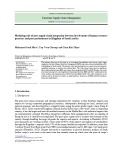
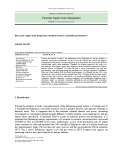
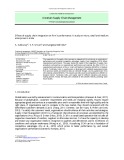

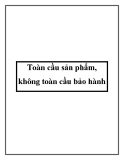



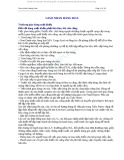

![Sổ tay Hướng dẫn phát triển chuỗi cung ứng [Chuẩn nhất]](https://cdn.tailieu.vn/images/document/thumbnail/2025/20251007/kimphuong1001/135x160/26201759828896.jpg)

![Bài giảng Logistic: Kho công cộng [Chuẩn Nhất]](https://cdn.tailieu.vn/images/document/thumbnail/2025/20250926/duyaokij2004@gmail.com/135x160/37761759129622.jpg)



![Bài giảng Mô hình và thiết kế hệ thống Logistics [chuẩn nhất]](https://cdn.tailieu.vn/images/document/thumbnail/2025/20250919/kimphuong1001/135x160/30911758252266.jpg)

![Trắc nghiệm nghiệp vụ giao nhận và khai báo hải quan [mới nhất 2024]](https://cdn.tailieu.vn/images/document/thumbnail/2025/20250916/dngapr1187/135x160/69491758016420.jpg)

![Bài giảng quản lý chuỗi cung ứng: Cung ứng và mua hàng [chuẩn nhất]](https://cdn.tailieu.vn/images/document/thumbnail/2025/20250915/nguyendinhdanhbgg2005@gmail.com/135x160/67081757989489.jpg)
![Đề thi Quản trị Logistics và chuỗi cung ứng quốc tế học kì 2 năm 2024-2025 có đáp án [Mới nhất]](https://cdn.tailieu.vn/images/document/thumbnail/2025/20250915/kimphuong1001/135x160/59591757927414.jpg)



